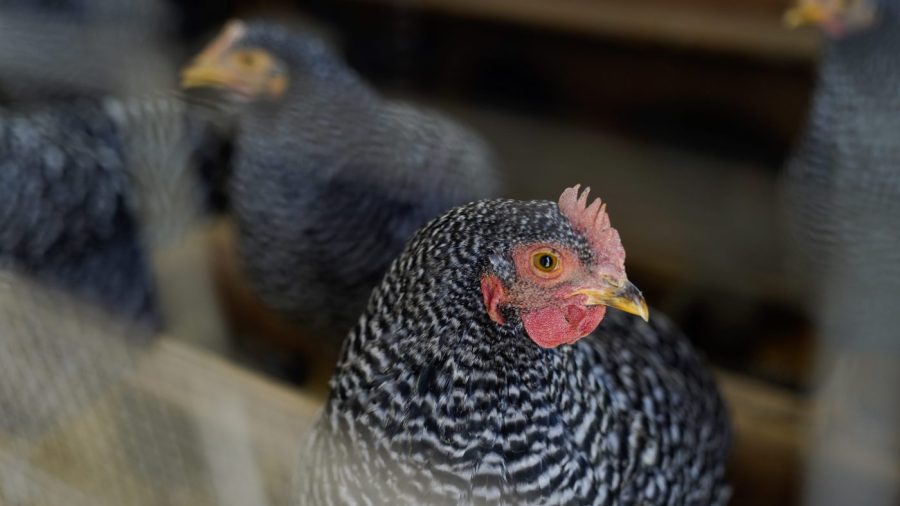Business
Federal regulators take a bite out of meat monopolies on November 10, 2023 at 10:30 am Business News | The Hill

Big meatpackers must warn chicken growers about the risks of the deals they’re entering into, according to a new federal rule enacted Wednesday.
The rule is part of a package of reforms the Biden administration has framed as steps to bring transparency and competition back to the meat industry, Department of Agriculture (USDA) Secretary Tom Vilsack said Wednesday.
The reforms, he said, take “critical steps in USDA’s competition and farmer fairness agenda.”
Other pieces in the package would direct the federal government to buy meat produced in the U.S. and create a new office to fight monopolies in agriculture.
A final part of the rule directs seed companies to display common varietal names alongside brand names — a reform akin to the way buyers of pain relievers know that they can get the chemical “acetaminophen” in the form of Tylenol or cheaper generic alternatives.
But for decades, independent farmers have complained about the effects of the rapid consolidation of the meat industry — something that the new USDA chicken rule aims to reverse.
In particular, that rule breathes new life into an old enforcement measure set up in the early 1900s to fight meatpacker monopolies: the Packers and Stockyards Act.
Since a wave of government-backed consolidation in the 1990s, poultry purchasing and processing have been primarily controlled by a handful of enormous meatpackers including Tyson and Pilgrims.
Farmers’ groups have long argued that the rise in this industry’s concentrated — and in many regions monopolistic — power has gone alongside corruption, market manipulation and retaliation against farmers that push back.
On Wednesday, the USDA released a new rule targeting what it sees as the worst abuses of the chicken sector.
The chicken industry is a fitting first target for what the agency has framed as a broader push to roll back anticompetitive farming practices.
For more than two decades, the agency has received complaints from chicken farmers who say that big meatpackers deceive them about the amount of money they would receive from deals — and then punish them with lower payments when they complain.
The opaque contracts left many growers in an impossible situation, according to the rule released Wednesday.
Since a wave of government-approved consolidations began in the 1990s, farmers have generally not owned the chickens they raise. Instead, the meatpacking companies do, along with the feed and medicine that turns them from chicks into market-ready “broilers.”
To get these contracts, farmers often must go heavily into debt to build the massive, state-of-the-art “chicken houses” the industry requires — an expense that makes it impossible to walk away if the deal turns out to be worse than they had expected.
These growers face a “gap between expected earnings” and what the company is actually willing to pay, the new rule argued.
For decades, chicken farmers have complained that a wave of government-backed mergers in the 1990s tipped the balance of power in the industry decisively to the side of the meatpackers — leaving them in a position some have compared to that of medieval serfs, in a process that growers of other meat have called “chickenization.”
In the dry language of the rule, the USDA calls out this dynamic: Packers, it said, “exert high degrees of discretion that can and do adversely affect growers.”
In particular, these companies tend to present a rosy picture of future earnings just long enough to get farmers locked into big, expensive upgrades that leave them trapped, the USDA wrote.
When farmers are debating whether to take on loans to expand their chicken houses, for example, poultry dealers “repeatedly and consistently omit vital information or make misleading statements, preventing growers from understanding the risks they are taking on,” the USDA wrote.
The leading poultry trade group attacked the rule, which it said aimed to create a flood of frivolous litigation.
“Make no mistake, this isn’t about transparency,” said Mike Brown, president of the National Chicken Council (NCC).
“This rule was specifically designed to chum the water for lawsuits,” he said, adding that it would “dismantle a successful industry structure that has benefited farmers, chicken companies and ultimately consumers all around the world.”
The NCC added that the timeline in the rule was too fast: Poultry packers “could have to retroactively amend 25,000 contracts in two months over three major federal holidays.”
But farmers’ groups praised the measure, though many said it didn’t go far enough.
“For far too long, monopolies across agriculture have put the squeeze on farmers and consumers,” said Rob Larew, president of the National Farmers Union.
“Today’s finalized rule will require poultry companies to be more honest in their dealings with growers.”
But a coalition of environmental groups argued that by restricting the rule to just the broiler chicken industry — leaving out eggs, milk, beef and pork — the USDA had caved to Big Meat.
“USDA must do more to actually protect farmers from corporate abuse, beyond merely informing producers how exploitative the system is,” said Emily Miller, an attorney at Food and Water Watch.
To be sure, the USDA is doing more — and large meatpackers aren’t happy about it.
Other rules would require federal buyers to procure only pork and beef raised in the U.S. — a potential value of about a billion dollars to U.S. farmers.
That is a measured step in a direction that American independent ranchers have agitated for since the Obama administration.
In the mid-2010s, the federal government dropped rules that had required that beef come with a label declaring where cows had been raised, butchered and processed — a step that ranchers had seen as essential to keep multinational meat corporations from undercutting with cheaper, imported beef.
When that rule changed, market prices and income for U.S. ranchers crashed, Bill Bullard of the independent ranchers organization R-CALF told The Hill.
Sarah Little, a spokesperson for the North American Meat Institute, said that the added profits ranchers might expect would come out of taxpayers’ pockets.
“Segregation of cattle and hogs to those born, raised and slaughtered in the U.S. will increase costs and will place the burden on school systems and the taxpayer at a time of great need,” she said.
The agency will also set up a chief competition officer to fight monopoly in the meat industry.
These steps are just the beginning: The USDA has proposed four new additions to Packers and Stockyards, including one that would make it easier for farmers to sue over discriminatory treatment.
But time is running out, said Angela Huffman of the progressive farmers trade group Farm Action, a timeline that she said Vilsack has fumbled before.
If those rules aren’t finalized by May — the deadline outlined in the Congress Review Act — a future Republican president or majority could easily overturn them.
“This is the same travesty against competition that happened during the Obama administration on Secretary Vilsack’s watch,” Huffman said.
“The Biden administration should take heed: In the absence of swift action, history could easily repeat itself,” she added.
Administration, Business, Equilibrium & Sustainability, News, Agriculture Department, usda Big meatpackers must warn chicken growers about the risks of the deals they’re entering into, according to a new federal rule enacted Wednesday. The rule is part of a package of reforms the Biden administration has framed as steps to bring transparency and competition back to the meat industry, Department of Agriculture (USDA) Secretary Tom…
Business
How Trump’s Tariffs Could Hit American Wallets

As the debate over tariffs heats up ahead of the 2024 election, new analysis reveals that American consumers could face significant financial consequences if former President Donald Trump’s proposed tariffs are enacted and maintained. According to a recent report highlighted by Forbes, the impact could be felt across households, businesses, and the broader U.S. economy.

The Household Cost: Up to $2,400 More Per Year
Research from Yale University’s Budget Lab, cited by Forbes, estimates that the average U.S. household could pay an additional $2,400 in 2025 if the new tariffs take effect and persist. This projection reflects the cumulative impact of all tariffs announced in Trump’s plan.
Price Hikes Across Everyday Goods
The tariffs are expected to drive up consumer prices by 1.8% in the near term. Some of the hardest-hit categories include:
- Apparel: Prices could jump 37% in the short term (and 18% long-term).
- Footwear: Up 39% short-term (18% long-term).
- Metals: Up 43%.
- Leather products: Up 39%.
- Electrical equipment: Up 26%.
- Motor vehicles, electronics, rubber, and plastic products: Up 11–18%.
- Groceries: Items like vegetables, fruits, and nuts could rise up to 6%, with additional increases for coffee and orange juice due to specific tariffs on Brazilian imports.

A Historic Tariff Rate and Economic Impact
If fully implemented, the effective tariff rate on U.S. consumers could reach 18%, the highest level since 1934. The broader economic consequences are also notable:
- GDP Reduction: The tariffs could reduce U.S. GDP by 0.4% annually, equating to about $110 billion per year.
- Revenue vs. Losses: While tariffs are projected to generate $2.2 trillion in revenue over the next decade, this would be offset by $418 billion in negative economic impacts.
How Businesses Are Responding
A KPMG survey cited in the report found that 83% of business leaders expect to raise prices within six months of tariff implementation. More than half say their profit margins are already under pressure, suggesting that consumers will likely bear the brunt of these increased costs.

What This Means for Americans
The findings underscore the potential for substantial financial strain on American families and businesses if Trump’s proposed tariffs are enacted. With consumer prices set to rise and economic growth projected to slow, the debate over tariffs is likely to remain front and center in the months ahead.
For more in-depth economic analysis and updates, stay tuned to Bolanlemedia.com.
Business
U.S. Limits Nigerian Non-Immigrant Visas to Three-Month Validity

In July 2025, the United States implemented significant changes to its visa policy for Nigerian citizens, restricting most non-immigrant and non-diplomatic visas to a single entry and a maximum validity of three months. This marks a departure from previous policies that allowed for multiple entries and longer stays, and has important implications for travel, business, and diplomatic relations between the two countries.

Key Changes in U.S. Visa Policy for Nigerians
- Single-Entry, Three-Month Limit: As of July 8, 2025, most non-immigrant visas issued to Nigerians are now valid for only one entry and up to three months.
- No Retroactive Impact: Visas issued prior to this date remain valid under their original terms.
- Reciprocity Principle: The U.S. cited alignment with Nigeria’s own visa policies for U.S. citizens as the basis for these changes.
- Enhanced Security Screening: Applicants are required to make their social media accounts public for vetting, and are subject to increased scrutiny for any signs of hostility toward U.S. institutions.

Rationale Behind the Policy Shift
- Security and Immigration Integrity: The U.S. government stated the changes are intended to safeguard the immigration system and meet global security standards.
- Diplomatic Reciprocity: These restrictions mirror the limitations Nigeria imposes on U.S. travelers, emphasizing the principle of fairness in international visa agreements.
- Potential for Further Action: The U.S. has indicated that additional travel restrictions could be introduced if Nigeria does not address certain diplomatic and security concerns.

Nigeria’s Updated Visa Policy
- Nigeria Visa Policy 2025 (NVP 2025): Introduced in May 2025, this policy features a new e-Visa system for short visits and reorganizes visa categories:
- Short Visit Visas (e-Visa): For business or tourism, valid up to three months, non-renewable, processed digitally within 48 hours.
- Temporary Residence Visas: For employment or study, valid up to two years.
- Permanent Residence Visas: For investors, retirees, and highly skilled individuals.
- Visa Exemptions: ECOWAS citizens and certain diplomatic passport holders remain exempt.
- Reciprocal Restrictions: Most short-stay and business visas for U.S. citizens are single-entry and short-term, reflecting reciprocal treatment.

Impact on Travelers and Bilateral Relations
- Nigerian Travelers: Face increased administrative requirements, higher costs, and reduced travel flexibility to the U.S.
- U.S. Travelers to Nigeria: Encounter similar restrictions, with most visas limited to single entry and short duration.
- Diplomatic Tensions: Nigerian officials have called for reconsideration of the U.S. policy, warning of negative effects on bilateral ties and people-to-people exchanges.
Conclusion
The U.S. decision to limit Nigerian non-immigrant visas to three months highlights the growing complexity and reciprocity in global visa regimes. Both countries are tightening their policies, citing security and fairness, which underscores the need for travelers and businesses to stay informed and adapt to evolving requirements.
Business
Nicki Minaj Demands $200 Million from Jay-Z in Explosive Twitter Rant

Nicki Minaj has once again set social media ablaze, this time targeting Jay-Z with a series of pointed tweets that allege he owes her an eye-popping $200 million. The outburst has reignited debates about artist compensation, industry transparency, and the ongoing power struggles within hip-hop’s elite circles.

The $200 Million Claim
In a string of tweets, Minaj directly addressed Jay-Z, writing, “Jay-Z, call me to settle the karmic debt. It’s only collecting more interest. You still in my top five though. Let’s get it.” She went further, warning, “Anyone still calling him Hov will answer to God for the blasphemy.” According to Minaj, the alleged debt stems from Jay-Z’s sale of Tidal, the music streaming platform he launched in 2015 with a group of high-profile artists—including Minaj herself, J. Cole, and Rihanna.
When Jay-Z sold Tidal in 2021, Minaj claims she was only offered $1 million, a figure she says falls dramatically short of what she believes she is owed based on her ownership stake and contributions. She has long voiced dissatisfaction with the payout, but this is the most public—and dramatic—demand to date.
Beyond the Money: Broader Grievances
Minaj’s Twitter storm wasn’t limited to financial complaints. She also:
- Promised to start a college fund for her fans if she receives the money she claims is owed.
- Accused blogs and online creators of ignoring her side of the story, especially when it involves Jay-Z.
- Warned content creators about posting “hate or lies,” saying, “They won’t cover your legal fees… I hope it’s worth losing everything including your account.”
She expressed frustration that mainstream blogs and platforms don’t fully cover her statements, especially when they involve Jay-Z, and suggested that much of the coverage she receives is from less reputable sources.

Satirical Accusations and Industry Critique
Minaj’s tweets took a satirical turn as she jokingly blamed Jay-Z for a laundry list of cultural grievances, including:
- The state of hip-hop, football, basketball, and touring
- The decline of Instagram and Twitter
- Even processed foods and artificial dyes in candy
She repeatedly declared, “The jig is up,” but clarified that her statements were “alleged and for entertainment purposes only.”
Political and Cultural Criticism
Minaj also criticized Jay-Z’s political involvement, questioning why he didn’t campaign more actively for Kamala Harris or respond to President Obama’s comments about Black men. While Jay-Z has a history of supporting Democratic campaigns, Minaj’s critique centered on more recent events and what she perceives as a lack of advocacy for the Black community.
The Super Bowl and Lil Wayne
Adding another layer to her grievances, Minaj voiced disappointment that Lil Wayne was not chosen to perform at the Super Bowl in New Orleans, a decision she attributes to Jay-Z’s influence in the entertainment industry.
Public and Industry Reaction
Despite the seriousness of her financial claim, many observers note that if Minaj truly believed Jay-Z owed her $200 million, legal action—not social media—would likely follow. As of now, there is no public record of a lawsuit or formal complaint.
Some fans and commentators see Minaj’s outburst as part of a larger pattern of airing industry grievances online, while others interpret it as a mix of personal frustration and performance art. Minaj herself emphasized that her tweets were “for entertainment purposes only.”

Conclusion
Nicki Minaj’s explosive Twitter rant against Jay-Z has once again placed the spotlight on issues of artist compensation and industry dynamics. Whether her claims will lead to further action or remain another dramatic chapter in hip-hop’s ongoing soap opera remains to be seen, but for now, the world is watching—and tweeting.

 Business2 weeks ago
Business2 weeks agoPros and Cons of the Big Beautiful Bill

 Advice3 weeks ago
Advice3 weeks agoWhat SXSW 2025 Filmmakers Want Every New Director to Know

 Film Industry4 weeks ago
Film Industry4 weeks agoFilming Yourself and Look Cinematic

 News2 weeks ago
News2 weeks agoFather Leaps Overboard to Save Daughter on Disney Dream Cruise

 Health2 weeks ago
Health2 weeks agoMcCullough Alleges Government Hid COVID Vaccine Side Effects

 Advice3 weeks ago
Advice3 weeks agoWhy 20% of Us Are Always Late

 Advice3 weeks ago
Advice3 weeks agoHow to Find Your Voice as a Filmmaker

 Entertainment2 weeks ago
Entertainment2 weeks agoJuror 25’s Behavior Sparks Debate Over Fairness in High-Profile Diddy Trial




























